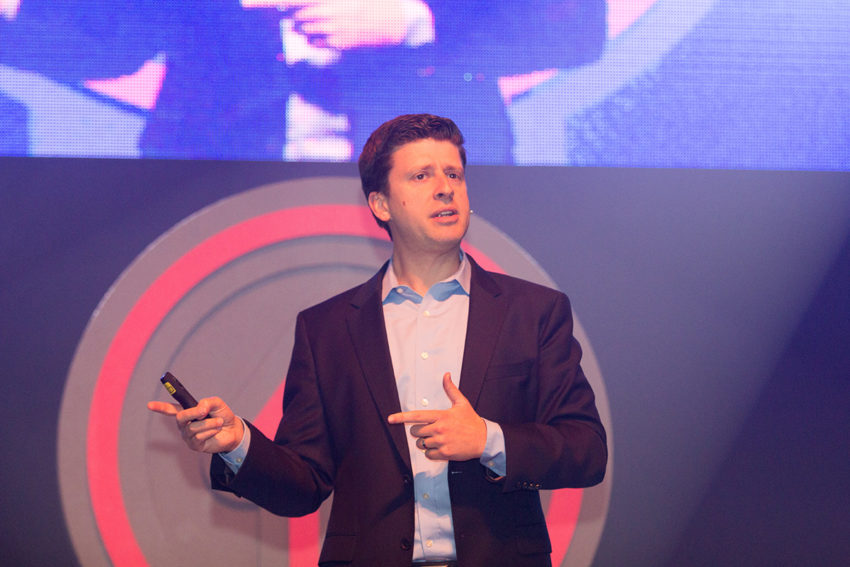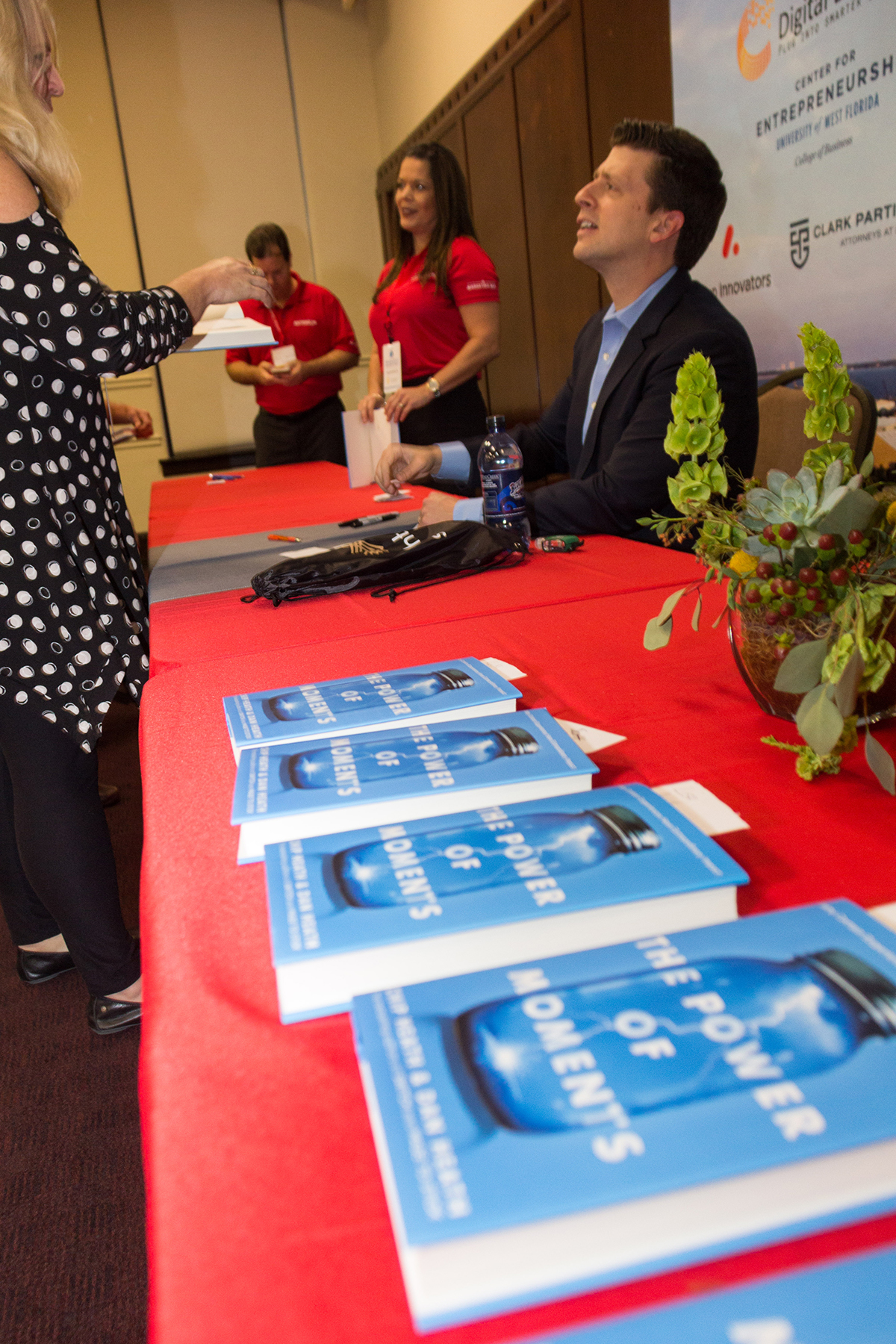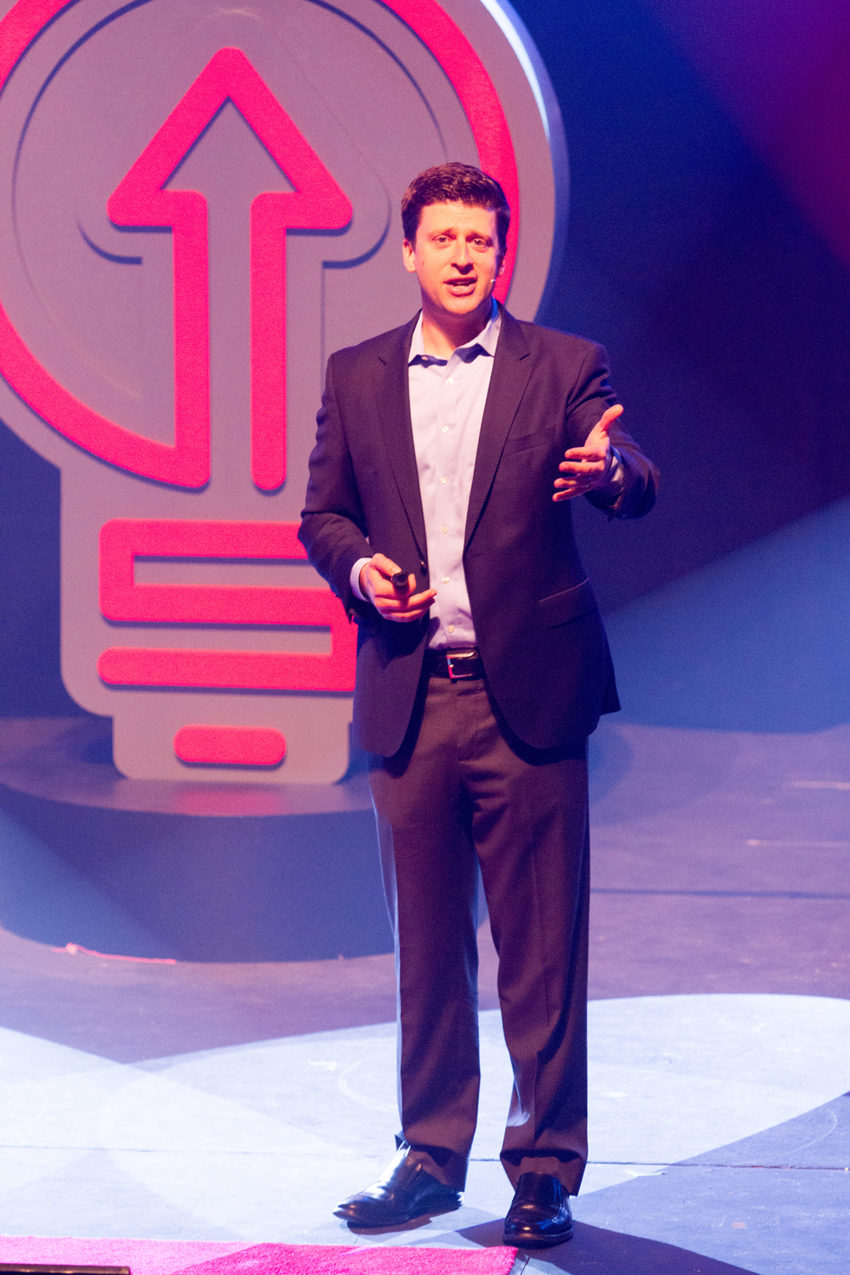Dan Heath closes EntreCon 2017 on “The Power of Moments”
- November 16, 2017
- / Shannon Nickinson
- / entrecon,training-development

Dan Heath, co-author of "The Power of Moments", delivered the closing keynote at EntreCon 2017 on Nov. 15.
The closer for EntreCon was author Dan Heath.
He and his brother Chip authored a new book, “The Power of Moments.” It is an addition to their catalogue, which includes business essential reads “Switch,” “made to Stick,” and “Decisive.”
Heath is also a senior fellow at Duke University’s CASE Center, which supports entrepreneurs who fight for social good.
Heath said this is the era of the experience. Customers, clients and even employees are judging companies and organizations not only on the what is provided them, but also on the experience created around getting that thing.
Companies now use language to express that — the customer experience, the patient experience, the student experience, the employee experience.
Heath said in studying how people rate and remember experiences, some trends emerge.
One phenomenon is called duration neglect. Essentially, it is when we remember an experience, the length of experience fades away, leaving us with just the moments we remember.
Over time, when we think of a family vacation to Disney World, the memory of how long we stood in line at Disney World, how hot was, how whiny the kids were fades.
What remains vivid is the fun we had together.
Then comes the peak-end rule: You tend to remember the peak of the experience and the end of the experience. Again, Heath said, consider the Disney paradox. While you’re there, you might rate the experience a 6.5 out of 10. Looking back, it’s a 9.
Because you remember the high points, and how you felt at the end of the trip.
“Great experiences hinge on peak moments,” Heath said. “In the business world, we’re not taught to make peaks. We’re taught to fix problems.”
There are, Heath said, four elements of peak moments:
— Elevation. These moments lift us above the every day.
— Insight. They reveal something about the way we view ourselves or the world changes. The “Eureka moment.”
— Pride. They reflect times when we were recognized, honored, when we stood up to do the right thing.
— Connection. Something about these moments draws us closer together to other people.
“We might think if we want to build a great experience, it’s got to be end-to-end greatness,” Heath said. “But really, a great experience is mostly forgettable and occasionally remarkable.”
But if you leave off the remarkable extra effort, you’re left with just forgettable. “I think this is the story of 90 percent of service businesses out there.”
In a typical survey, businesses will ask people to rate the experience on a scale of 1 to 10, 1 being terrible, 10 being terrific. You could use that information one of two ways.
What if you could eliminate the 1, 2, 3’s — the really negative reviews and feedback — and get them to neutral. Or, you can get the neutrals — the people who gave it a score of 5-7 — up to positive.
Which strategy would pay off more?
Based on research, Heath found that moving the neutrals to positives, would be nine times more valuable. But companies typically spend 80 percent of their effort trying to move the complaints and problems.
“We play all defense and no offense,”
Focusing on getting people to neutral — to celebrating the simply satisfied customer — does not create a great experience.
It’s like seeking reward and recognition for long drive on the interstate free of potholes.
“The absence of a pothole is not a peak,” Heath said. “And great experiences hinge on peaks.”
Later he prompted the audience to make eye contact with someone they didn’t know and then use these four questions to have a five-minute chat.


 CivicCon launches with a look at good growth in cities
CivicCon launches with a look at good growth in cities
 Building stronger brains one baby, one parent at a time
Building stronger brains one baby, one parent at a time
 SCI debuts commercial on Early Learning City
SCI debuts commercial on Early Learning City
 Entrecon: World class speakers and an opportunity to sharpen skills
Entrecon: World class speakers and an opportunity to sharpen skills
 PYP Quality of Life survey 2017
PYP Quality of Life survey 2017
 EntreCon Pensacola 2016: A look back
EntreCon Pensacola 2016: A look back
 Leadership tip: getting better employee takeaways
Leadership tip: getting better employee takeaways
 Leadership tip: be interested instead of interesting
Leadership tip: be interested instead of interesting
 Leadership tip: delivering difficult messages
Leadership tip: delivering difficult messages
 Brain Bags boost Arc, Early Childhood Court programs
Brain Bags boost Arc, Early Childhood Court programs